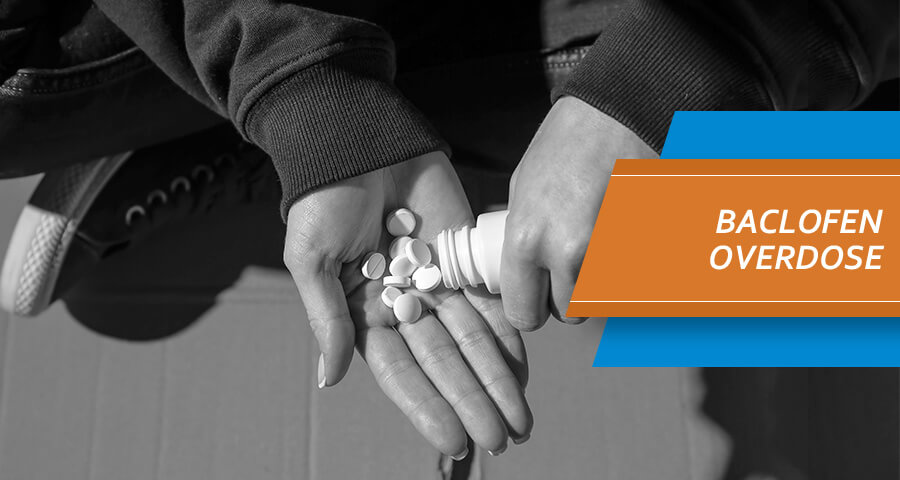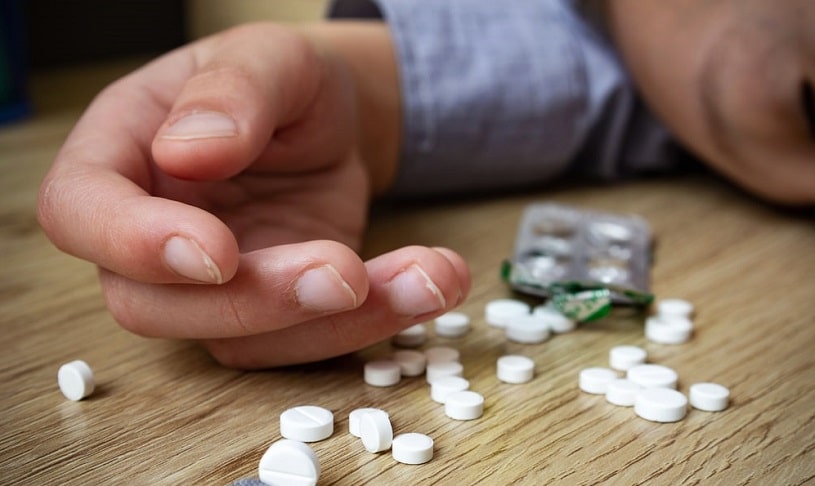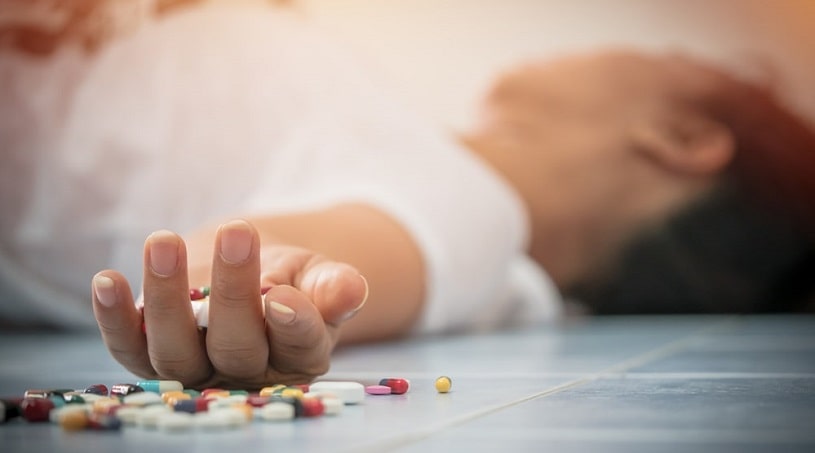Baclofen Overdose: Understanding The Symptoms, Risks, And Treatment

Baclofen (brand name Lioresal among others) is used as a muscle relaxer to control muscular rigidity and clonus caused by injuries and other medical conditions. The medicine works by blocking or reducing the signals generated by the nerves that cause muscular tension and rigidity. Once those signals are suppressed, muscles can relax and calm down.
Table Of Contents:
Lioresal is an effective medication; however, it can still cause side effects. When it is abused and taken in higher amounts than prescribed, there is a risk of Baclofen overdose. Drinking alcohol on Lioresal or mixing it with other substances can also become a cause of Baclofen toxicity.
Learn more about overdose causes, how much Baclofen to overdose, and if it can be lethal.
What Is Baclofen Overdose?
Lioresal overdose symptoms tend to occur when a person takes a dosage that is higher than prescribed. Generally, treatment with the medicine should be started with a dosage of 15 mg daily in divided doses. Management of symptoms associated with conditions treated by Lioresal is achieved through a dosage of 60 mg daily, in most cases. However, a patient should always keep in mind the max daily dose.

Another cause of Baclofen toxicity is taking it with alcohol or other substances. Baclofen alcohol mix has proven to be dangerous due to the drug’s effect on the central nervous system. Drinking on Lioresal or taking it with opioids can cause a dangerous level of respiratory depression. This respiratory depression, if left without treatment at a hospital, can lead to coma and even death.
So, how much Baclofen to overdose? Any amount higher than prescribed can lead to unpleasant symptoms. However, one study stated that doses higher than 200mg could predict the development of seizures and other OD symptoms and require treatment.
Snorting Baclofen As an Overdose Cause
Snorting is an unsafe method of administration that is popular among recreational users. Recreational use equals abuse: it is illegal and dangerous to one’s health.
Drugs usually hit the brain cells significantly faster when snorted, that is why this is the easiest way to overdose on Baclofen. The possibilities of feeling Lioresal adverse effects are even higher as the drug reacts quicker in the body than it is supposed to. The reaction of a person who takes a Lioresal 10 mg orally will be milder than one that snorts a 10 mg Baclofen pill powder, even though both scenarios contain the same dose.
People who abuse Lioresal by taking it in high quantities or by risky routes of administration, e.g., snorting, are under the severe risk of damaging their health and experiencing an OD.
Reported Cases of Overdoses
The largest reported case of Baclofen overdose was about 3000mg in a 47-year-old woman with a histrionic personality disorder, reactive depression, and longstanding back pain, which led to an unsuccessful spinal fusion. The woman was found unconscious alongside three recently prescribed empty bottles of Lioresal and an empty wine bottle. Eight days later, the patient died in hospital. The body absorbs therapeutic doses of Lioresal rapidly, and maximum levels of the drug in the bloodstream are reached within one to two hours. The half-life of Lioresal in most cases is around 5.5 hours. Therefore, conventional dosages are eliminated from the body within 24 hours. On the other hand, large doses are not as quickly absorbed, and they tend to have an 8.6-hour half-life. As a result, Lioresal takes up to 72 hours to be eliminated when taking in large doses, explaining why a user experiences severe effects.

For instance, a case reported by John J. Miller told us about a 48-year-old white female who was admitted to the ER after a family member found her unresponsive and in respiratory distress. The family reported that a patient took no medications, and there was no significant substance abuse history other than the occasional intake of husband’s diazepam tablets for insomnia. The woman later admitted taking a handful of pills obtained from a friend with an intention to overdose. Bearing in mind that the family didn’t know anything about the drug and a woman denied taking the pills initially, the already complicated Baclofen overdose treatment became even more problematic.
Besides inadequate use of the substance, poisoning also occurs due to the buildup of Lioresal caused by abnormal kidney function. As a result, kidneys don’t excrete the drug fast enough, even when a patient takes the recommended dosage.
The substance is similar to GHB but less addictive. Recreational use of the substance is not encouraged nor allowed, particularly among patients who don’t know anything about how much Baclofen to overdose, thus jeopardizing their health and life.
Recreational use equals abuse and is against the law. Those who are engaged in this activity can end up in a prison or rehabilitation center.
Symptoms of Overdose on Baclofen
When taken in normal, therapeutic amounts, the drug is relatively safe and does not induce the risk of OD. Of course, like other pills, adverse reactions may occur, such as anxiety, drowsiness, weakness, headache, vomiting, nausea, and other Lioresal side effects. Lioresal is poisonous and toxic in large quantities due to the impact on the nervous system.
Typical Features of Lioresal Toxicity Are Manifested Through Different Symptoms:
- Seizures
- Non-convulsive status epilepticus (persistent change in the level of consciousness, behavior, autonomic function)
- Confusion
- Drowsiness
- Delirium
- Coma requiring ventilation and intubation
- Deep coma including symptoms mimicking brain death
- Slow or sluggish response of the pupil to light
- Cardiovascular changes
- Sinus bradycardia associated with hypertension
- Opposite of hypotension and tachycardia
- Hypotonia or low muscle tone
- Decrease or loss of limb reflexes
Persons who experience Baclofen toxicity have difficulty breathing, lightheadedness, and lower than average body temperature. Scientists noticed that the same symptoms of overdose were observed in adults and adolescents.
Many people aren’t aware that Baclofen overdose death may also occur. While in some cases, the symptoms can just mimic brain death, in others, even with treatment patients fail to recover.
Baclofen Overdose Treatment
Treatment of overdose on Baclofen consists of supportive care involving IV fluids, mechanical ventilation, and endotracheal intubation.
In acute ingestions, the use of activated charcoal may be warranted. Treatment of agitation or seizures may require the use of benzodiazepines. Vasopressors could help hypotensive patients. Clinical effects associated with Baclofen toxicity last between four and eight hours. In one case study, a 23-year-old woman was discharged from the hospital only on the 14th day. A patient may need to undergo hemodialysis to increase the clearance of the substance to shorten the duration of toxicity with impaired kidney function.

Lioresal overdose side effects and reactions are numerous, meaning patient education is crucial for avoiding unwanted scenarios. While the medication usually works in about two hours, patients with impaired kidney function tend to have a different experience as pills take longer to work. The drug may require close monitoring, so knowledge about a patient’s health and history may help physicians and healthcare providers protect them from a potential overdose. Baclofen, as a muscle relaxer, when overdosed, has no known antidote.
Use Baclofen Only as Prescribed
Regardless of the purpose for which the medicine is prescribed, there is a risk of Lioresal poisoning if caution is not taken. Baclofen overdose death is also possible. It can be prevented through adequate use of the pills, patient education, deep insight into the patient’s health, and raising awareness among adults and adolescents.
In the case of drug abuse, the risks are even higher. People who start abusing Lioresal can neglect the doctor’s advice and take it in higher doses or combine it with alcohol. As each body is unique, for some, it can cause nothing but slight discomfort. However, others might need professional Baclofen overdose treatment. To stay on the safe side, the medication should only be taken as prescribed.
If signs of abuse are present, rehab centers can help deal with addictions. It’s better not to stop the medication abruptly, as it will lead to Lioresal withdrawal. Contact a doctor about different treatment options to quit the medication safely.
Hope Without Commitment
Find the best treatment options. Call our free and confidential helpline
Most private insurances accepted
Page Sources
- Cooper, D. J., & Bergman, J. (2000). Massive baclofen overdose. Critical Care and Resuscitation, 2, 195-197. https://pubmed.ncbi.nlm.nih.gov/16599897/
- Miller, J. J. (2017). Baclofen overdose mimicking anoxic encephalopathy: a case report and review of the literature. Therapeutic advances in drug safety, 8(5), 165-167. https://www.ncbi.nlm.nih.gov/pmc/articles/PMC5444597/
- Leung, N. Y., Whyte, I. M., & Isbister, G. K. (2006). Baclofen overdose: defining the spectrum of toxicity. Emergency Medicine Australasia, 18(1), 77-82. https://pubmed.ncbi.nlm.nih.gov/16454779/
- Sullivan, R., Hodgman, M. J., Kao, L., & Tormoehlen, L. M. (2012). Baclofen overdose mimicking brain death. Clinical Toxicology, 50(2), 141-144. https://pubmed.ncbi.nlm.nih.gov/22292975/
- May, C. R. (1983). Baclofen overdose. Annals of emergency medicine, 12(3), 171-173. https://pubmed.ncbi.nlm.nih.gov/6829997/
- Wolf, E., Kothari, N. R., Roberts, J. K., & Sparks, M. A. (2018). Baclofen toxicity in kidney disease. American Journal of Kidney Diseases, 71(2), 275-280. https://pubmed.ncbi.nlm.nih.gov/28899601/

 Authored by
Authored by  Reviewed by
Reviewed by 



